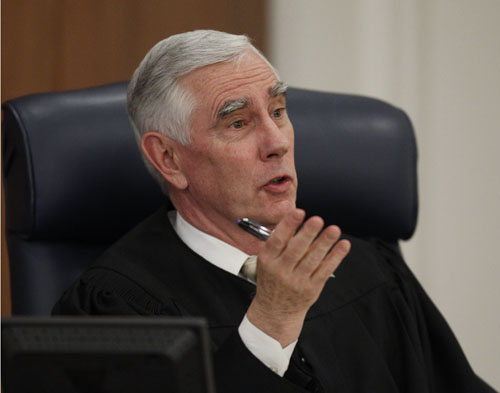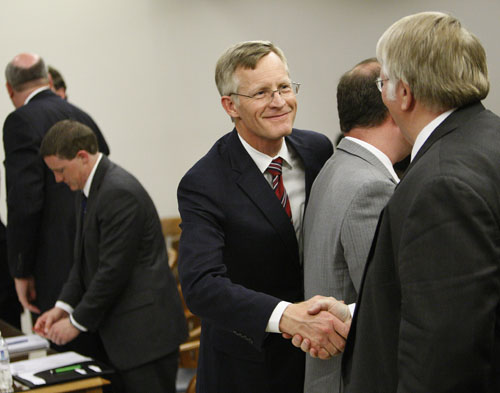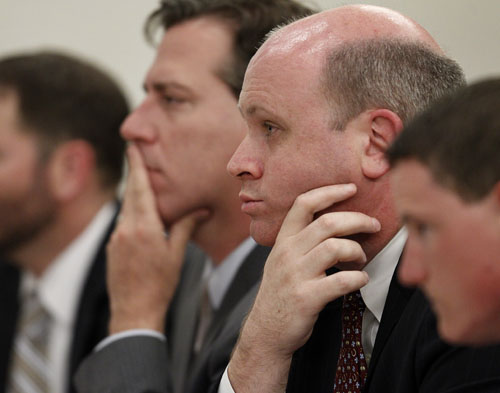Judge overturns decision on open special election
CARSON CITY -- It looks as if the Sept. 13 special election to replace former GOP Rep. Dean Heller won't be the flash mob of candidates that Republicans had feared.
In a decision that stunned the Democratic Party and buoyed the GOP, a district judge Thursday overruled Secretary of State Ross Miller's May 5 decision to allow any qualified major party candidate to run in a free-for-all U.S. House race.
Instead, Judge James Todd Russell enjoined the secretary of state from moving ahead. And he gave the political parties until June 30 to nominate just one candidate each, the ruling the Republican Party sought in a lawsuit filed against Miller.
The decision boosts the chances the GOP will keep the 2nd Congressional District, which covers all of GOP-leaning rural and Northern Nevada and parts of Clark County. And it hurts the Democrats' hopes of winning it for the first time in what would have been a crowded contest with at least four major GOP contenders splintering the vote.
"What a relief," GOP national committeewoman Heidi Smith said from inside the Carson City courtroom after the judge ruled from the bench after a two-hour hearing. "It was ridiculous to think there could have been 200 or 300 people on the ballot. This puts things back to normal."
The Democratic Party and the attorney general's office -- whose lawyers argued the case -- seemed stunned by the decision and refused immediate comment. The attorneys, a total of five, huddled after the judge ruled, and several shook their heads in disbelief.
Deputy Attorney General Kevin Benson said the state is considering whether to appeal the decision to the Nevada Supreme Court, a move the judge said he expected.
Russell said he based his decision on the reading of two related statutes that govern special and regular elections. He said they were confusing and contradictory, and suggested the Legislature clarify the law to avoid confusion. Taken together, he said they require the parties to nominate candidates for the ballot.
He said the 2003 special election law, passed after Sept. 11, 2001, to handle unexpected House vacancies, says there should be no primary election, but candidates must be "nominated" before filing a declaration of candidacy. A separate statute says the major parties' central committees and the minor parties' executive committees should nominate candidates when there's a vacancy, the judge said.
Russell said the secretary of state was "picking and choosing" portions of the law to back up his decision to allow a free-for-all, or what Miller called a "ballot royale." The judge said it also didn't seem fair for Miller to set different rules for major and minor parties, which the secretary of state said could nominate only one candidate each.
"Why are these people being treated differently?" Russell asked about the major political parties. "Is that really fair? That doesn't make sense to the court."
Miller, a Democrat, and the Democratic Party said that because the special election law doesn't allow for a major party primary, any Republican or Democrat could get on the ballot. The Democratic attorneys argued the law gives Miller the authority to set the rules, and he should be given leeway to decide whether there's any confusion in the statutes.
"The state of Nevada deserves more slack to make this system run in case of the unusual" special election, argued Marc Elias, a big-gun Democratic Party attorney brought in from Washington, D.C., to help argue the case.
David O'Mara, one of two GOP attorneys arguing the case, said state history shows that the parties have chosen nominees in the past, a special election to fill an unexpected vacancy that happened in 1954 to replace a U.S. senator who had died.
"We have a tradition in Nevada where our nominees are nominated through the parties," O'Mara said, whereas Miller wants to let candidates "nominate themselves."
Allowing party leaders to pick a nominee will avoid splintering the GOP vote among four main Republican contenders running to replace Heller. He was appointed earlier this month to complete the term through 2012 of disgraced U.S. Sen. John Ensign.
If Russell's ruling stands, tea party favorite Sharron Angle will have a tough time getting on the ballot because the GOP outsider has much less support after losing the 2010 U.S. Senate race to Sen. Harry Reid, D-Nev. She said she won't run as an independent.
Kirk Lippold's chances of getting the GOP nod seem slim to none. The former commander of the USS Cole has denounced the idea of party leaders nominating a candidate.
Nevada GOP Chairman Mark Amodei is considered the leading insider candidate to win the nomination when the party's central committee meets in a month. He said Thursday that he plans to resign as party chief within days in order to focus on his campaign.
Republican hopefuls must win over the 300-plus members of the GOP central committee before a June 18 meeting scheduled to choose a nominee. At the same time, candidates must be raising money and appealing to voters for the Sept. 13 special election.
State Sen. Greg Brower of Reno is the main competition for the insider GOP vote. He's been reaching out to party leaders already. The former U.S. attorney for Nevada was appointed to complete former state Sen. Bill Raggio's term.
Several Democrats also are competing to fill the House vacancy through the end of 2012. Party leaders are expected to back State Treasurer Kate Marshall. Viewed as the strongest contender, Marshall was recruited by the national party.
Other Democratic contenders are Nancy Price and Jill Derby, former higher education officials who both have lost to Heller before. Derby, a former state party chairwoman, nearly beat Heller in 2006 and has a lot of support within the party as well.
Contact reporter Laura Myers at lmyers@reviewjournal.com.



















